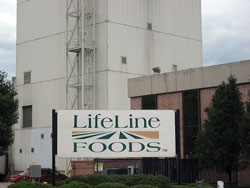 Cindy is attending this week’s Fuel Ethanol Workshop in Nashville, TN and will be primarily posting onto Domestic Fuel. I think she’s in the process of uploading some photos as we speak. This one is from when she attended LifeLine Foods opening last fall. I thought it was appropriate in light of this announcement from ICM, Inc. This is exactly the kind of thing we can expect if all the whacko food vs. fuel folks will allow us to use good old American ingenuity to solve our dependence on foreign oil problem. Lifeline is a working plant that partnered with ICM for the technology they’re using.
Cindy is attending this week’s Fuel Ethanol Workshop in Nashville, TN and will be primarily posting onto Domestic Fuel. I think she’s in the process of uploading some photos as we speak. This one is from when she attended LifeLine Foods opening last fall. I thought it was appropriate in light of this announcement from ICM, Inc. This is exactly the kind of thing we can expect if all the whacko food vs. fuel folks will allow us to use good old American ingenuity to solve our dependence on foreign oil problem. Lifeline is a working plant that partnered with ICM for the technology they’re using.
ICM, Inc. today announced that ethanol biorefineries investing in the company’s new, proprietary and innovative technology before the end of this year, will be capable of commercially producing both food and fuel in 2010. The announcement was made during ICM’s customer meeting at the annual Fuel Ethanol Workshop (FEW) in Nashville, Tenn.
“We are talking about the ‘ethanol biorefinery of the future’…and very near future at that,” said Dave Vander Griend, founder, president and CEO. “Fifty years ago, the U.S. fed the world. We will be able to do that again with a food supply brought about by the evolution of ethanol production.”
Since the company’s founding, ICM’s mission has been to sustain agriculture through innovation. Recently, the company’s mission expanded to researching ways to deliver much-needed protein to the world, by way of ethanol processing. At the same time, the corn-to-ethanol industry is maturing, and a changing economic outlook is prompting existing biorefineries to explore means of maintaining financial success in challenging tight-ethanol, high-corn price markets. ICM recognized this changing outlook and is delivering on its mission by developing technology to create “new renewables” that can be built upon the existing ethanol biorefinery – the key facilitator of the new technology is a process called dry fractionation.
